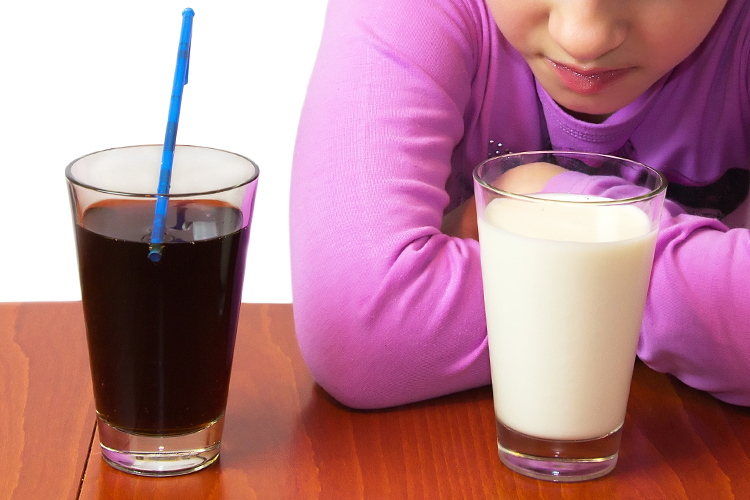Blog
Soft drinks vs dairy – what will the liver have to say?
 Soft drink. It can taste appealing, and is a little addictive. It is also a nutritionally devoid liquid sugar providing excess energy, primarily in the form of added fructose, negatively impacting our dear bodies.
Soft drink. It can taste appealing, and is a little addictive. It is also a nutritionally devoid liquid sugar providing excess energy, primarily in the form of added fructose, negatively impacting our dear bodies.
Our liver in particular is copping a thrashing.
However, energy value may not be the primary issue, but perhaps the source of energy.
Soft drink vs Dairy – liquid calories are not created equal
In a 6-month intervention study, 47 non-diabetic Danish participants were required to drink 1 litre of sugar-sweetened cola, diet cola, semi-skimmed milk or mineral water daily, to compare impact of these beverages on fat mass and organ and muscle fat deposit. (1)
Fat mass, and liver and muscle fat where measured, along with markers for cardiovascular health. Diet (aspartame sweetened) cola and mineral water showed a little impact on outcomes; but cola and milk are where the juicy results were revealed:
Sugar sweetened cola intake caused:
- Significant increase in liver fat (143% when compared with milk). Eek.
- Raised blood triglycerides (a precursor for heart disease)
- Higher total cholesterol
- Increased blood pressure
- Increased visceral fat mass (the nasty abdominal fat)
Semi-skimmed dairy milk intake caused:
- Reduced liver fat by 10%
- Reduced blood pressure
- Increase in lean body mass
So it seems milk, with a similar caloric value to the cola, is providing some pretty good health outcomes, despite having naturally occurring sugars. This especially when compared with soft drinks, which are typically loaded with fructose.
Ah, fructose.
The evidence continues to mount that this simple sugar, when consumed in high amounts and independent of its natural sources (i.e. fruit), contributes to all kinds of health issues. And a refreshing can of cola makes increased fructose, and calorie, consumption just too easy.
Excess liquid energy
It has been found that people consuming soft drink do not amend their caloric intake from foods to compensate for the additional energy being drunk. (2) The soft drink calories are on top of our normal food and drink intake; meaning we are consuming more (empty) calories overall.
Perhaps a clear indication as to our rise in diet related disease, including weight gain.
And it is the liquid sugar that our body’s hunger hormone does not respond to, meaning we can keep chugging away without the fullness, or satiety, trigger telling our brains to stop.
The conclusion?
From our perspective – Drinking mineral water or a fat containing beverage such as milk will offer better health outcome, due each of these providing satiety in a way a sugar sweetened beverage will not.
From the study’s perspective – Drink less sugar sweetened soda drinks to improve population health. Period.
P.S. Some conjecture
It is important to note, if briefly, that at least one author involved in the study above has ties to the dairy industry in Denmark.
Dr Arne Astrup is openly transparent about payments received as a board member from the Global Dairy Board, the European Dairy Association and Danish Dairy (listed in the footnotes of this New England Journal of Medicine article).
So one may think the results would want to favour the consumption of dairy (especially, as mentioned in the study, as a decrease of diary consumption over the past 50years could be correlated with the decline in population health…).
However, Dr. Astrup is also on the McDonalds Global Advisory Council. So let’s play devil’s advocate and believe that the results were not influenced by any funding sources.
References:
- Maersk, M, Belza, A, Stødkilde-Jørgensen, H, Ringgaard, S, Chabanova, E, Thomsen, H, Pedersen, SB, Astrup, A, & Richelsen, B 2012, ‘Sucrose-sweetened beverages increase fat storage in the liver, muscle, and visceral fat depot: a 6-mo randomized intervention study’, The American Journal Of Clinical Nutrition, vol. 95, no. 2, pp. 283-289
- Vartanian, L, Schwartz, M, & Brownell, K 2007, ‘Effects of soft drink consumption on nutrition and health: a systematic review and meta-analysis’, American Journal of Public Health, vol. 97, no. 4, pp. 667-675 9p











